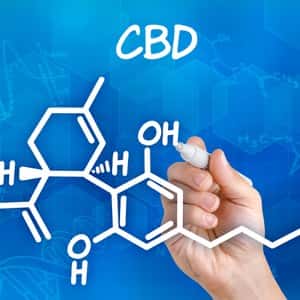
One lesson learned from the terrible opioid crisis of the past few years: a lot of Americans are in a lot of pain. With doctors increasingly reluctant to prescribe narcotics for pain relief, people are looking around for substitutes. One compound that has garnered a good bit of interest lately is cannabidiol, aka CBD. Cancer patients utilize cannabinoids from the same plant that produces marijuana to alleviate cancer pain (Journal of Pain Research, April 23, 2018). People who suffer severe recurrent migraines are also turning to cannabis compounds (Journal of Headache Pain, May 24, 2018). One tricky question: will use of such agents result in a person being identified as a drug abuser? Many people utilizing CBD by swallowing it, smearing it on their skin or vaping it would like to know the answer.
Cannabinoids for Back Pain:
Q. The discs and vertebrae in my spine are degenerating and causing me severe pain. I started taking CBD oil for pain a few months ago.
Once it had time to build up in my system, the pain relief was miraculous. Sadly, I recently did a home drug test and it was positive for THC. I need to talk to my doctor because I have no idea how to address this. It’s legal to buy CBD oil OTC in my state, but there’s no way to prove it is the source of any THC in my test.
A. Cannabidiol (CBD) oil is legal in many states because it does not make people euphoric. It is not supposed to have any tetrahydrocannabinol (THC) in it. THC is the compound that produces a marijuana high. State by state regulation means that anyone who wishes to use this compound for pain relief will need to become familiar with the relevant laws of that state.
The FDA has approved one purified form of cannabidiol as a prescription anticonvulsant medication, Epidiolex. In addition, research on CBD oil suggests some benefit against pain and inflammation (Molecules, online, Sept. 27, 2018). However, scientists have not yet determined the circumstances in which it might be most valuable.
Side Effects of Cannabidiol:
People using cannabidiol have reported fatigue, nausea, diarrhea and irritability. People on the anticoagulant warfarin (Coumadin) should avoid cannabidiol, as it may raise blood levels of warfarin. Like grapefruit, CBD can inhibit the intestinal enzyme CYP3A4, which the body uses to process a wide range of medications (Current Drug Metabolism, 2016).
But Will It Lead to a Positive Urine Test for Marijuana?
Unfortunately, certain CBD manufacturers are not able to remove all traces of THC. One study found that some people tested positive for THC after taking CBD oil (Journal of Pain Research, Feb. 12, 2016). ConsumerLab.com has written that people taking CBD oil aren’t likely to fail a marijuana drug test, but it is not impossible.
According to recent research, people who consume CBD by vaping run a risk of positive urine drug tests for marijuana (Journal of Analytical Toxicology, Nov. 4, 2019).
The scientists concluded:
“Accurate labeling and regulation of ∆9-THC content in CBD/hemp products are needed to prevent unexpected positive drug tests and unintended drug effects.”
Another reader had a similar experience, testing positive for marijuana while using only CBD.
CBD and the Positive Marijuana Test:
Q. In my state, marijuana use is illegal. I started using CBD products to treat nerve pain after a shingles attack. I’m not sure that it worked all that well, but the CBD helped me get through until a neurologist could figure out a treatment program.
The problem is I tested positive for marijuana even though I was only using CBD. How could that happen?
A. CBD is short for cannabidiol, a compound found in Cannabis sativa, the Latin name for marijuana. CBD does not make people high like another marijuana compound, tetrahydrocannabinol (THC). Despite this, some CBD products may contain enough THC or other cannabinoids to set off alarms on a drug test. It’s impossible to say whether this is due to inherent biological variability in the source plants or contamination during processing.
In theory, CBD has nothing to do with THC.
But as Yogi Berra has been quoted,
“In theory, there is no difference between practice and theory. In practice, there is.”
Citations
- Darkovska-Serafimovska M et al, "Pharmacotherapeutic considerations for use of cannabinoids to relieve pain in patients with malignant diseases." Journal of Pain Research, April 23, 2018. doi: 10.2147/JPR.S160556
- Baron EP et al, "Patterns of medicinal cannabis use, strain analysis, and substitution effect among patients with migraine, headache, arthritis, and chronic pain in a medicinal cannabis cohort." Journal of Headache Pain, May 24, 2018. doi: 10.1186/s10194-018-0862-2
- Bruni N et al, "Cannabinoid delivery systems for pain and inflammation treatment." Molecules, online, Sept. 27, 2018. doi: 10.3390/molecules23102478
- Zendulka O et al, "Cannabinoids and Cytochrome P450 interactions." Current Drug Metabolism, 2016. DOI: 10.2174/1389200217666151210142051
- Wertlake PT & Henson MD, "A urinary test procedure for identification of cannabidiol in patients undergoing medical therapy with marijuana." Journal of Pain Research, Feb. 12, 2016. doi: 10.2147/JPR.S96856
- Spindle TR et al, "Urinary pharmacokinetic profile of cannabinoids following administration of vaporized and oral cannabidiol and vaporized CBD-dominant cannabis." Journal of Analytical Toxicology, Nov. 4, 2019. https://doi.org/10.1093/jat/bkz080

